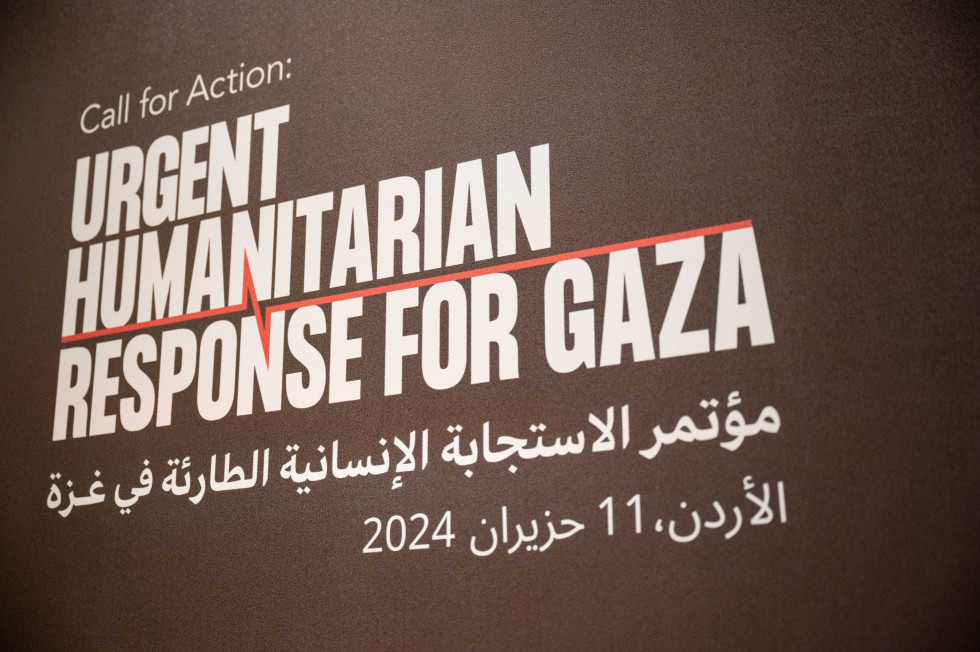Prime Minister Golob: An additional EUR 2.5 million for humanitarian programmes to help the Palestinian people

The international conference "Call for Action: Urgent Humanitarian Response for Gaza" | Author Boštjan Podlogar/STA
In a statement to Slovenian media, the Prime Minister said that world leaders, representatives of major humanitarian organisations and other conference attendees were all united behind a single message to the world: the situation in the region, particularly the humanitarian situation, is catastrophic. He believes that the UN Security Council resolution adopted yesterday is very clear and gives hope for a two-state solution, but action must be taken immediately and swiftly. "The Slovenian Government therefore decided to commit an additional EUR 2.5 million through various UN programmes to provide immediate humanitarian aid for the Palestinian people." This is a continuation of Slovenia’s concrete efforts to mitigate the humanitarian disaster in Gaza, as Prime Minister Golob vowed after the adoption of the decision to recognise the State of Palestine.
In the morning, the Prime Minister met with UN Secretary-General Antonio Guterres, the President of the State of Palestine, Mahmud Abbas, the UNRWA Commissioner-General, Philippe Lazzarini, and the Prime Minister of Spain, Pedro Sánchez. He told Commissioner-General Lazzarini that Slovenia today guaranteed to provide additional humanitarian funds to help the Palestinian people, one million euros of which will be allocated to the UNRWA. Slovenia will also get actively involved in developing educational programmes to bring more than 600,000 Palestinian children new hope for a better future.
Expressing great satisfaction, Secretary-General Guterres praised Slovenia for its active role in the UN Security Council. According to the Secretary-General, Slovenia’s voice in New York was indispensable, widely heard and considered on the most challenging and sensitive issues related to the resolution of the conflict in the Middle East. Prime Minister Golob acquainted the Secretary-General with Slovenia’s planned activities for September in New York, when the country will take over the Security Council Presidency.
President Abbas expressed his sincere gratitude for Slovenia’s efforts and recognition of Palestine as a sovereign and independent state. He hoped that Slovenia’s courage would set an example for other EU countries to follow. Prime Minister Golob and President Abbas welcomed today’s UN Security Council resolution, stressing the need for immediate implementation.
On the margins of the conference, the Prime Minister also met with Spanish Prime Minister Sánchez, discussing the EU election results and yesterday’s UN resolution.
Later in the day, Prime Minister Golob will address the high-level guests of the international conference. The conference guests include presidents and prime ministers, the President of the European Council, Charles Michel, the US Secretary of State, Antony Blinken, and representatives of major humanitarian organisations. Finally, the Prime Minister will meet with King Abdullah II of Jordan and Egyptian President el-Sisi.
Yesterday, Prime Minister Robert Golob welcomed the adoption of a UN Security Council resolution calling for a full, complete and immediate ceasefire with the unconditional release of hostages, which he believed was a major diplomatic achievement. The resolution also calls for the development of plans to reconstruct the enclave, which was the topic of the Prime Minister’s talks today with other world leaders, leading UN representatives and main humanitarian organisations. "Slovenia is proud of its contribution to the adoption of a resolution, which brings hope for peace," said the Prime Minister.
The aim of the conference is to strengthen international efforts to ease the humanitarian crisis in Gaza, which include reaching a deal on peace and the release of hostages, finding ways to increase the delivery of urgent humanitarian aid, and ensuring key services for the civilian population, such as medical care, access to drinking water and energy supplies. Discussions also centre on preventing the forced displacement of civilians and ensuring the basic living conditions of displaced people. The key role in these efforts is performed by international humanitarian agencies, headed by the UN Relief and Works Agency for Palestine Refugees in the Near East (UNRWA). The high-level conference guests are also discussing preparations for the reconstruction of Gaza once peace is established.

